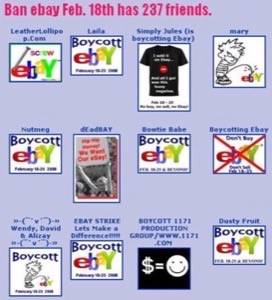Last week we wrote about a boycott of online auction site eBay that was organized by sellers angry over recent fee and policy changes. We noted that the full effect of the boycott wouldn’t be evident until today, when the consumer action was scheduled to come to an end. “If [eBay’s listings total] falls below 12 million we’ve made a pretty good impact,” eBay PowerSeller Nancy Baughman told Fortune Small Business last week. Listings didn’t fall quite that much, but almost.

USA Today reports that eBay’s listings were down 13% over the week to 13 million, according to third party tracking firms. Though eBay officially denies the dip, analysts see the seller strike as a harbinger for tough times to come for eBay.
eBay is facing stiff competition, especially from Amazon who unabashedly admits it wants eBay sellers for its Sell Your Stuff service. But more interesting than the success or failure of the boycott and what it means for the online auction industry, is why this action had a more significant impact than similar eBay boycotts in the past.

USA Today theorizes that the reason this seller strike was able to work where others in the past have barely made a dent was that organizers used social media sites to quickly bring people together on the issue. Boycott organizers created a YouTube video that has been viewed over 140,000 times, and they used MySpace to spread the word about the boycott and sign people up to their cause. (A Facebook group had much less traction.)
We’ve seen social networking sites be used to organize protests in the past. Earlier this month a massive political protest in Colombia that attracted as many as 2 million people was organized in large part via Facebook. While the eBay boycott was far smaller, the same dynamics are at play. Social networking and social media sites let people get ideas out very quickly, and allow people organize around a common goal without much lead time.
This sort of nearly spontaneous organization is a perfect demonstration of the utility that social networking and media has the potential to provide. More than just a place for people to super poke each other and share party photos, social networking has the ability to organize people to effect change. Have you ever used social media to organize some sort of social, political, or consumer action? Let us know about it in the comments.

















